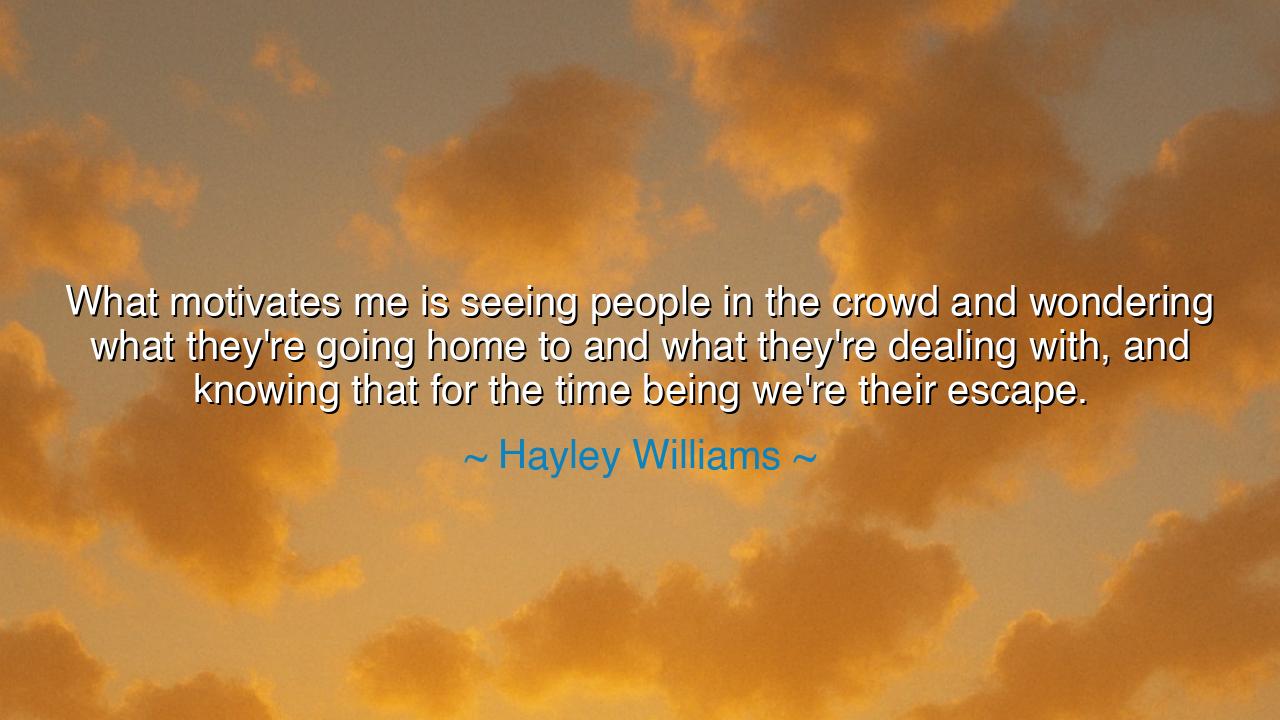
What motivates me is seeing people in the crowd and wondering
What motivates me is seeing people in the crowd and wondering what they're going home to and what they're dealing with, and knowing that for the time being we're their escape.






In the witness of Hayley Williams, we hear the vow of the minstrel-priest: “What motivates me is seeing people in the crowd and wondering what they’re going home to and what they’re dealing with, and knowing that for the time being we’re their escape.” These are not the fireworks of vanity but the steady lanterns of service. The singer stands upon the threshold between noise and need, and she remembers that each face is a harbor of storms. To make a song, in this telling, is to build a small bridge over a great night—and to hold it while strangers cross.
The ancients would call this the art of consolation. The theater at Epidaurus cured more than ears; it aired the ache of the polis, letting grief and joy breathe together. So too here: the crowd is not a mass but a thousand unspoken biographies. Someone is going home to silence that hurts, another to bills that do not bend, another to the hour of confession they fear to keep. When the musician says, “for the time being we’re their escape,” she is not cheapening reality; she is granting the body and the mind a sabbath—a pocket of light in which courage can mend.
Do not mistake the word escape. It is not the coward’s flight but the healer’s pause. The bow lifts from the string so the string does not snap. The runner slows so the heart may run farther. In this measure, what motivates me becomes a covenant: to carry the weight of noise so others can set down the weight of living, if only for one chorus, one drumbeat, one held note that refuses to fall. This is mercy set to a tempo.
Consider a true story from a city under siege. In the nights of the Blitz, when London’s streets were stitched with fire, Vera Lynn sang to soldiers and to families in shelters. Her voice did not end the war; it ended, briefly, the tyranny of the minute. Parents still returned to ration books; telegrams still arrived. Yet for those minutes, the people remembered themselves as more than frightened bodies—they were beloved and brave. That is the lineage of the modern stage when it serves rightly: not spectacle, but shelter; not distraction, but reprieve.
Or look to the tale of Orpheus, who played so purely that stones wept and gates remembered they once were trees. The myth is fierce in its warning—art alone cannot overturn death—but it blesses the attempt. Music escorts us to the doors we must pass through ourselves. In the same spirit, Hayley Williams watches the crowd and asks the oldest pastoral question: “What burden do you bear, traveler?” The answer is not always spoken; it does not need to be. The song replies by making space.
From this saying, learn the craft of noticing. If you lead, create moments where others may lay down their armor: classrooms with generous silence, shops with honest welcome, homes with laughter that is allowed to linger. If you sing or speak, aim at the person and not the applause. Ask, before you perform or persuade: Who is dealing with sorrow here? Who is going home to fear? Then tune your work toward tenderness, toward the kind of rhythm that returns strength rather than spending it.
And practice these actions: (1) Before any task, name one person you serve; hold their face in mind. (2) Build a brief ritual of mercy—five minutes of breath, a note of gratitude, a walk outside—that you can offer yourself and others for the time being. (3) When you gather a crowd, set a clear intention: “Let this be rest.” (4) After the music ends, do one small, practical good—send the message, wash the dish, make the call—that helps someone meet what they are dealing with when they are going home. Thus your labor will rise from mere performance to ministry, and your escape will not be a door that shuts on truth, but a window that opens it to light.






AAdministratorAdministrator
Welcome, honored guests. Please leave a comment, we will respond soon